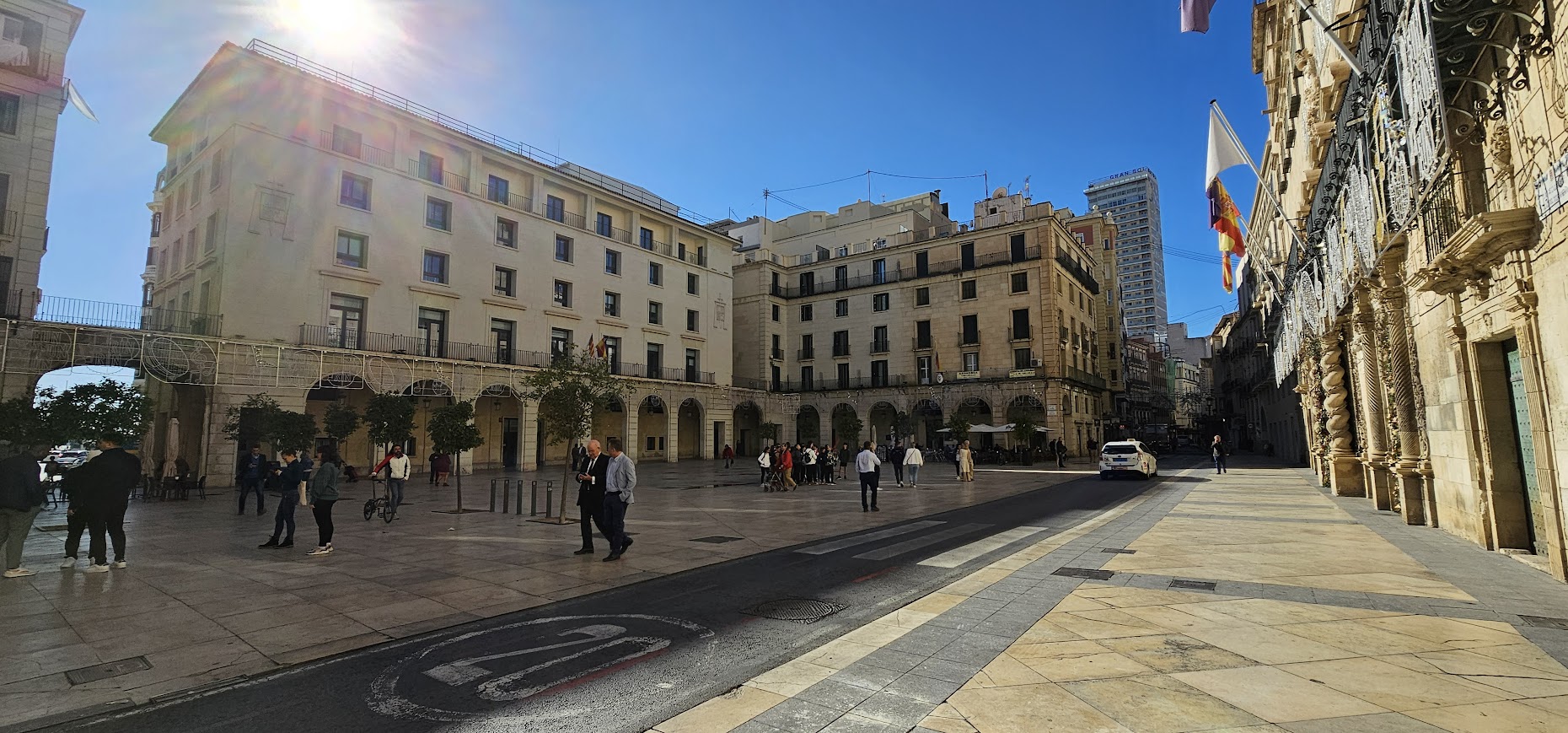Costa Blanca
Calpe plans to spend €450,000 to upgrade pavements and bike lanes

The bike lane between Calle La Niña and Letonia on Avenida de los Ejércitos Españoles is going to be altered by Calpe City Council. To increase safety for both users, the area allotted for bicycles and pedestrians is to be appropriately redistributed.
At the moment, the bike lane is situated on the innermost portion of the sidewalk and runs parallel to it without a curb. A one-metre-wide sidewalk and, at the end, a garden space run parallel to the bike lane, which faces the road. By moving the pavement to this innermost end, these projects hope to make it easier for pedestrians to visit the nearby stores without having to cross the bike route.
Putting money into security
In order to make the path safer for both cyclists and pedestrians, the pedestrian sidewalk will also be widened, extending from one to three metres, and will be divided from the bike lane by a landscaped space of more than one metre, where trees and street furniture will be placed. In turn, a gap of nearly one metre will divide the bike lane from the parallel parking strip that runs the length of this portion.
Along with planting trees and updating the street furniture, the project will also involve putting in a bike lane with a unique pavement that is more appropriate and long-lasting for this purpose.
A four-month execution period
Within the framework of the Recovery, Transformation and Resilience Plan, which is funded by the European Union – Next Generation, this project is part of the Sustainable Tourism Destination Plan, which is supported by the State Secretariat for Tourism and the Valencian Community Tourism Department.
With a base value of €449,682.13, the project has already been placed out to bid and is presently undergoing evaluation before being awarded. Four months is the estimated completion time.
Councillor for Infrastructure Juan Manuel del Pino stressed that the project is part of the Calp council’s commitment to encouraging bicycle use and pedestrian routes. “With this initiative, we not only aim to create a safer route for residents but also to facilitate their mobility and accessibility along one of Calpe’s main thoroughfares,” he said.
Discover more from Costa Blanca Daily
Subscribe to get the latest posts sent to your email.
Costa Blanca
Arrested in Murcia for activities linked to jihadist terrorism

A person has been apprehended in the province of Murcia for alleged terrorist offences by Guardia Civil officers, who are under the supervision of Central Investigation Court No. 2 and the Prosecutor’s Office of the National Court.
Since 2019, the detainee has been aligned with a variety of terrorist organisations, including DAESH. More recently, he has radicalised his behaviour and activities.
The detainee’s family background was previously known, as a close relative was expelled from the country in 2020 for activities that violated national security. This action was taken in response to a complaint lodged by the Guardia Civil’s counterterrorism units with the competent authority.
It was noted that he conducted an extensive number of internet searches and retained information regarding the operation and storage of firearms and explosive devices during the investigation.
Additionally, he conducted information enquiries on the security forces. The requisite measures were instituted to mitigate the potential threat that this individual could pose, as there was substantial evidence of his purported terrorist activities.
After the detainee was brought before the competent judicial authority, he was ordered to be imprisoned.
Discover more from Costa Blanca Daily
Subscribe to get the latest posts sent to your email.
Business and Financial
Goodbye to traditional credit cards: the most radical change is here, and banks confirm it

Credit cards have been utilised for years to make purchases, make online payments, pay for subscriptions, or pay for any service or supply. Nevertheless, they have also become an ideal target for digital larceny and scams. The rationale? Their printed 16 digits, which are indispensable for transactions, can also be exploited by fraudsters to gain access to our bank accounts. However, the finance sector is currently undertaking an unprecedented initiative to address this vulnerability. Please note that we will be saying goodbye to credit cards, or at least to how we used to use them.
Mastercard and Visa are currently investing in this change to enhance user security. The objective is evident: to abandon conventional cards with visible numbers and replace them with more secure, intelligent, and, most importantly, more difficult to replicate versions. It is no longer solely about aesthetics; it is about digital survival. This is the reason why the financial sector is preparing to definitively bid farewell to conventional credit cards. Although some individuals may have already experienced the change or are currently observing the changes in their cards, others will observe it over the next few years as a result of a system that is based on technologies such as tokenisation. This system marks a before and after in the way we interact with digital money, protect ourselves, and pay, and we will elaborate on this in detail below.
Farewell to conventional credit cards
The credit card companies that we all use, Visa and Mastercard, are in the process of preparing for a change that will impact millions of people worldwide. Visa appears to have been employing a technology for more than a decade, which, according to official data, has generated over 10 billion tokens since 2014. Revolut and Wise have been providing virtual and physical cards with these new measures for an extended period, and it is estimated that they have successfully prevented at least 650 million forgeries as a result of their dedication to this system.
Additionally, Mastercard is one of the most frequently utilised payment networks on a global scale. Until recently, all of its cards contained a sequence of 16 visible digits that, while necessary for identifying the country, entity, and account type, also served as a gateway for various forms of fraud. However, Mastercard’s new security strategy suggests that it will begin by removing this visible numbering entirely, beginning with its partnerships with financial institutions such as AMP Bank.
Mastercard has stated that its objective is to ensure that all of its users have cards without visible numbers by 2030. This initiative is a wager on a new era in which banking data is not susceptible to malicious digital captures or prying eyes.
Tokenisation is the critical factor: what is it and how does it alter everything?
Tokenisation is the primary innovation that underpins this transformation. It is a system that substitutes conventional printed numbers with a unique, transient code (the token) that is automatically generated each time a purchase is made. This code is non-reusable and ceases to exist upon transaction verification. Therefore, they would be unable to do anything with it even if they were to intercept it.
This system would render it impossible for a cybercriminal to replicate the transaction, even if they attempted to fraudulently use your card. This new protocol enhances cybersecurity to unprecedented levels and eliminates one of the primary vulnerabilities of the current system: the direct exposure of sensitive data.
Absolute user control and biometric authentication
An additional significant benefit of this new technology is that users will have much greater control over their cards. The new cards will rely on biometric authentication to validate transactions, as they lack engraved numbers or visible data. This may include fingerprint, facial recognition, or mobile app authentication.
Furthermore, this new system eliminates the necessity of manually inputting card details for each online purchase. Tokens will be employed by compatible payment platforms to expedite and secure the completion of transactions, ensuring that your information is not stored or disclosed.
When will I obtain my new card without numbers?
The only action you will likely need to take is to wait, regardless of whether you have a Visa or Mastercard. When it is time to renew your current card for a new generation card, your bank will notify you. Some banks have initiated the procedure, while others will do so in the coming years, prior to the final deadline of 2030.
It is advisable to maintain the security of your data and consistently enable two-step verification for online transactions until that time. However, those who have experienced an identity theft attempt or card theft can rest assured that the future is here and it is replete with security.
Discover more from Costa Blanca Daily
Subscribe to get the latest posts sent to your email.
Costa Blanca
Man acquitted of sexual assault charges in Elche

A young man has been absolved of alleged sexual abuse against his flatmate in the early hours of September 8th, 2022, at a residence in the Elche area by the section of the Alicante Court based in Elche. The Court determined that the evidence presented did not reasonably preclude the possibility of the complainant’s consent. The tribunal employed the legal principle of ‘in dubio pro reo’, which requires a resolution in favour of the accused when there are reasonable doubts about their guilt.
The individuals involved had a prior relationship with a history of “physical contact and mutual flirting,” as the facts outlined in the verdict. Both individuals acknowledged that they had engaged in intimate interactions both prior to and subsequent to the incident in question. The forensic report verified that no physical injuries or instances of violence were documented.
The accused, who was represented by attorney José Manuel Ortega, informed the judges that all interactions with the complainant, his flatmate for approximately a year, were “consensual and voluntary” for both parties. This assertion has been corroborated by the judicial resolution.
In his testimony, he described their intimate relationship as characterised by “frequent sexual encounters,” sharing space on the sofa, and even sleeping together once or twice a week. He also asserted that their initial sexual encounter took place on the sofa approximately three months after they began living together. He also stated that their interactions frequently began with teasing, without either party explicitly seeking permission or engaging in follow-up discussions.
The accused stated that he was unaware of the reasons why the young woman decided to press charges in relation to the complaint. He suggested that the reasons may have been motivated by “jealousy” or a desire to “justify to a new partner the sexual relationship they had.” The accused also disclosed that they continued to reside together subsequent to the complaint, despite his subsequent departure from the flat. He observed that the police had visited the residence on numerous occasions as a result of cohabitation issues, including commotion or other minor disputes.
The tribunal observed that the complainant did not expressly express her refusal at the time of the events, and that the accused may not have perceived a clear lack of consent during the evidence evaluation. Additionally, the court noted substantial contradictions and omissions in the version provided by the alleged victim, such as the absence of prior relationships or the previous context of intimacy.
In this regard, the ruling underscores the distinction between the presumption of innocence, which pertains to the burden of proof, and the principle of “in dubio pro reo,” which is applied to the assessment of evidence when, despite the presence of evidence, a reasonable doubt regarding the elements of the crime persists.
The tribunal has issued an acquittal and lifted all precautionary measures that were agreed upon during the process, as it was unable to establish with the necessary certainty that the accused committed a wilful act, not even with eventual intent. No party has appealed the sentence, which is final.
Discover more from Costa Blanca Daily
Subscribe to get the latest posts sent to your email.
-

 Costa Blanca1 week ago
Costa Blanca1 week agoThis week the DGT will issue over 64,000 speeding tickets
-

 Costa Blanca1 week ago
Costa Blanca1 week agoSix arrested for the use of AI to defraud over 19 million euros
-

 Costa Blanca2 weeks ago
Costa Blanca2 weeks agoThis weekend Alicante will be visited by three NATO ships
-

 Costa Blanca1 week ago
Costa Blanca1 week agoBeware if you receive an orange envelope in your postbox
-

 Costa Blanca1 week ago
Costa Blanca1 week agoWhy aren’t salaries in Spain rising while everything else is?
-

 Costa Blanca2 weeks ago
Costa Blanca2 weeks agoFire in Benidorm sees two being treated for smoke inhalation
-

 Costa Blanca2 weeks ago
Costa Blanca2 weeks agoWhat is the reason for the disappearance of Chinese bazaars in Spain?
-

 Costa Blanca6 days ago
Costa Blanca6 days agoSpanish family killed in helicopter crash in New York












